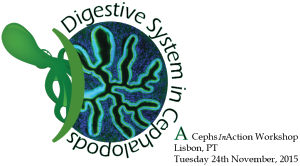Publication
It is aimed to publish on scientific journal proceedings from the workshop. Further details are available here!!!
a CephsInAction Workshop
under the aegis of the COST Action FA1301

The digestive tract has not been the subject of extensive study, in contrast to many areas of cephalopod biology. Understanding its normal functioning has wide ranging implications for aquaculture, fisheries and for the care and welfare of cephalopods in the laboratory where research is now subject to regulation under Directive 2010/63/EU.
This one-day workshop is the occasion for an update on “the Digestive Tract of Cephalopods” through discussion on several important topics including physiology, nutritional requirements and diet in the wild, digestion and metabolism, welfare.
It is aimed to publish on scientific journal proceedings from the workshop. Further details are available here!!!
Lisbon (Cascais) Portugal
| Program Outline |
9:00 Welcome & Introduction
The physiology of the cephalopod digestive tract: An introduction to a neglected topic – P. Andrews (UK)
9:30 Capture, ingestion and diet of cephalopods in the wild
Prey detection and capture by cephalopods – R. Villanueva (Spain)
How do cephalopods learn what to avoid eating? Studies in cuttlefish – A-S. Darmailacq (France)
Distribution and diet of benthopelagic squids off the Portuguese coast: methodologies and preliminary results – S. Lourenço (Portugal)
The planktonic stage of Octopus vulgaris paralarvae in the wild: dispersal, diet and microbiome – A. Roura (Australia)
Intestinal flora of wild Octopus vulgaris paralarvae and their zooplankton prey: a metagenomic search of “probiotics” for use in aquaculture – A. Roura (Australia)
Coffe break (10:55 – 11:15)
11:15 Development and nutritional requirements of the first stages of cephalopods
Beak development in cephalopods paralarvae – R.M. Franco-Santos (Germany)
A 3D description of the development of the gut in Octopus vulgaris paralarvae – R. Fernandez Gago (Spain)
Yolk consumption during embryonic development and endogenous feeding phase of Octopus vulgaris paralarvae – F. Rocha (Spain)
Octopus tetricus paralarvae rearing in Western Australia – S. Kolkovski (Australia)
A meta-analyses approach to the effects of live prey on the growth of Octopus vulgaris paralarvae under culture conditions – D. Garrido (Spain)
Effects of marine phospholipid in stress and nutritional biomarkers of Octopus vulgaris paralarvae under standard culture conditions in three research centres – D. Garrido (Spain)
Relationship between the standard growth rate and synthesis of arms in common octopus paralarvae (Octopus vulgaris, Cuvier 1797) fed by different preys, spider crab zoeas vs. Artemia – M. Nande (Spain)
Lunch (13:10 – 14:10)
14:10 Digestion and metabolism in cephalopods (part I)
Studies on digestive physiology of Octopus maya: the road to design the food – C. Rosas (Mexico)
Advances in the structure of the Cephalopod digestive gland: On the microanatomy of a polyvalent organ – P.M. Costa (Portugal)
Current framework for Octopus vulgaris artificial diet development – T. Rodríguez-González (Spain)
Digestive physiology of cuttlefish: effect of the quality of food – A. Sykes (Portugal)
Partial characterization of the digestive enzimatic activity in Octopus vulgaris paralarvae and adults – P. Domingues (Spain)
Novel approaches and results on fatty acid metabolism of Octopus vulgaris and Sepia officinalis – O. Monroig (Spain)
Study of the expression of different genes involved in the biosynthesis of long-chain polyunsaturated fatty acids (LC-PUFA) during the early development of the common octopus paralarvae (Octopus vulgaris) – J. Moura (Portugal)
Coffe break (16:20 – 16:40)
16:40 Digestion and metabolism in cephalopods (part II)
Paralarvae metabolic profile of common octopus (Octopus vulgaris) in the early stages of life – E. Almansa (Spain)
Dietary effect on the proteome of Octopus vulgaris paralarvae – I. Varó (Spain)
17:20 The gut and cephalopod welfare
Toxins in cephalopods and digestive tract detoxification mechanisms: An overview – P.R. Costa (Portugal)
Accumulation, responses and genotoxicity of trace elements in Octopus vulgaris – J. Raimundo (Portugal)
Malabsorption syndrome in cephalopods: studies with Aggregata – C. Gestal (Spain)
Could be used the digestive gland of Octopus vulgaris paralarvae as an indicator of starvation? – R. Fernandez Gago (Spain)
The digestive tract and welfare of cephalopods in the laboratory and aquaculture: A facilitated discussion of the issues in relation to objectives of COST Action FA1301-CephsInAction – P.L.R. Andrews (UK), E. Almansa (Spain)
18:45 Final discussion and Closing Remarks
Digestive system in cephalopods Organizing Committee
Eduardo Almansa – ES (coordinator of the Committee) Pedro Domingues – ES
Paul Andrews – UK Joao Pereira – PT
Giovanna Ponte, Chair of FA1301 COST Action
| M | T | W | T | F | S | S |
|---|---|---|---|---|---|---|
| 1 | 2 | 3 | 4 | 5 | 6 | |
| 7 | 8 | 9 | 10 | 11 | 12 | 13 |
| 14 | 15 | 16 | 17 | 18 | 19 | 20 |
| 21 | 22 | 23 | 24 | 25 | 26 | 27 |
| 28 | 29 | 30 | ||||
This website is supported by COST, European COoperation in Science and Technology
